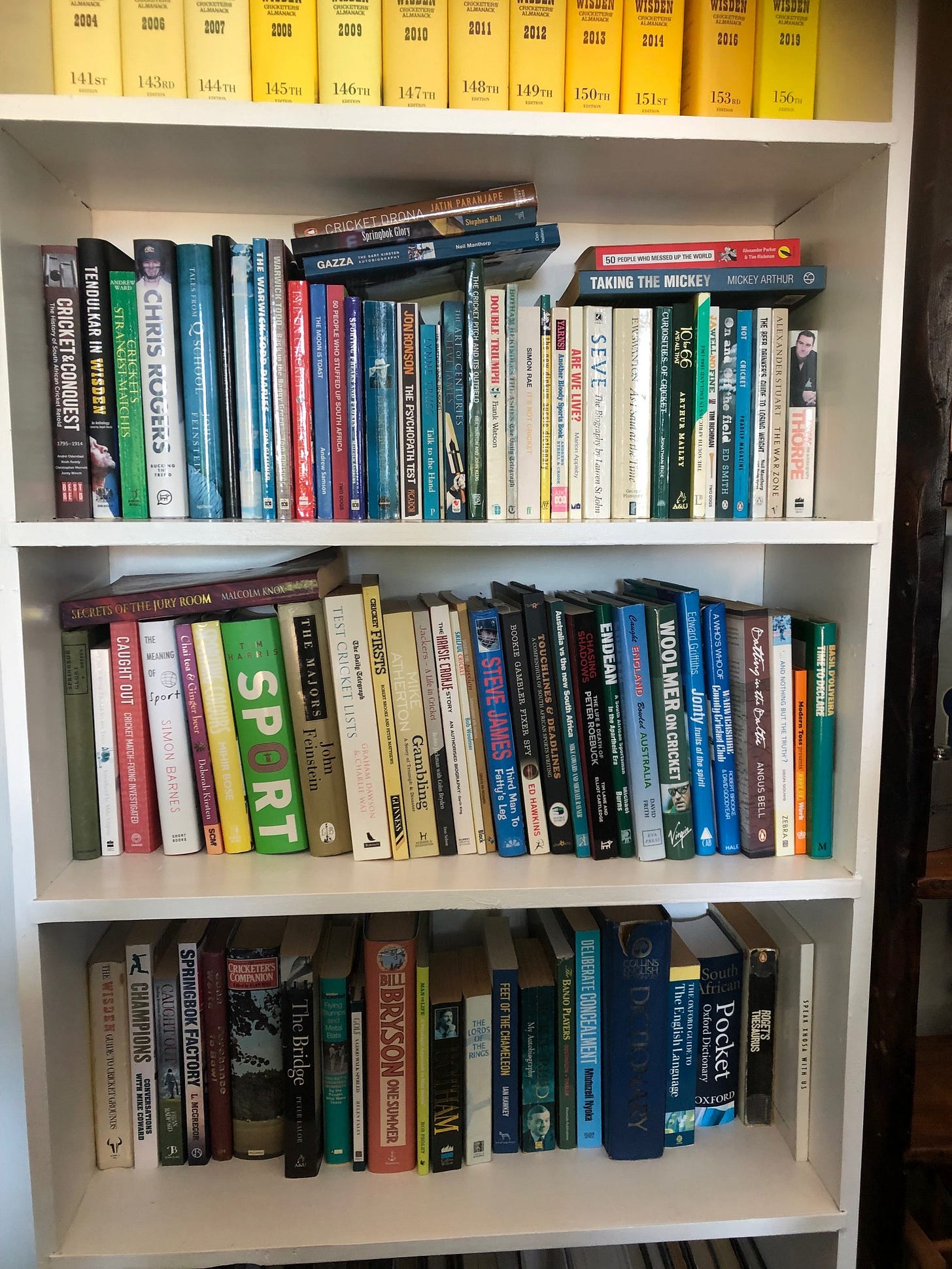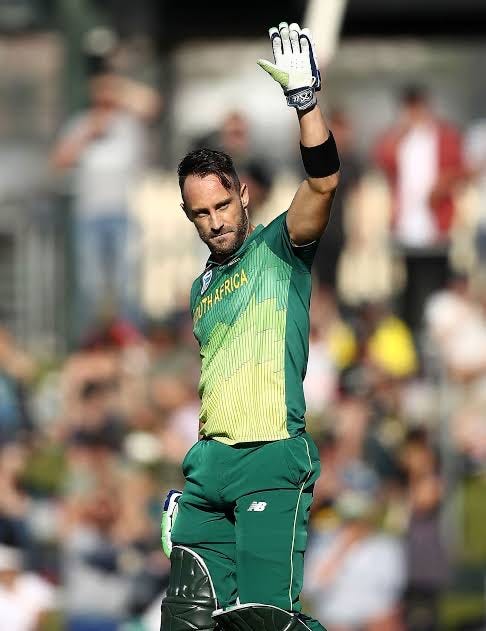In my study there are a couple of bookshelves of biographies, mostly cricketing but not exclusively. Some of them I’ve even written, and some I’ve actually read. Honesty demands that I admit the majority have been glanced through and several remain on my ‘to do’ list.
It would be unfair to say they’re ‘all the same’ because everyone’s story is different but, well, cricket is cricket and we’ve all spent more than half our lives away from home and have had to grow up on the road and on the job, playing the game or reporting on it.
So, when a courier delivered: “Faf – Through Fire” at around 3:00pm a couple of weeks ago I placed it on a far corner of my desk to have a look at later. Then I opened it, just to ‘have a look.’ Ten minutes later it was 6:15pm. I was on family dinner duty. I ordered Uber Eats to go with Mintgate and Sandpapergate, having already done Zipgate. His guilt and innocence are both equally unvarnished.
It’s all there. From attempting to cheat in school exams at Affies (and AB de Villiers shielding his answers to prevent him from doing so) to binge-drinking on an SA Under-19 tour and living in a scoreboard while playing club cricket in England.
All the scandals and controversies are there, but so are the moments of triumph and celebration, and they are treated with an equal measure of searing honesty – and, where appropriate, humour. Few of the protagonists in his career are ‘spared’, but he is especially hard on two of them: David Warner and himself. Warner is spared any du Plessis ‘judgement’. It isn’t necessary. Simple recollections of the man’s behaviour on the cricket field allow the reader to make their own.
Warner was one of the key reasons du Plessis was so successful against Australia. He is the only South African in the modern era to finish with a better batting average against Australia than any other team. One of the ‘problems’ against other teams, he explains, was that he had to ‘identify’ someone in the opposition as nasty as Warner to provide him with similar motivation – and wasn’t always able to do so. Perhaps it shouldn’t be a laughing matter, but I did, out loud. Couldn’t help it.
At the end of the fourth day of Du Plessis’ Test debut in Adelaide in 2012, I was commentating for ABC radio and willingly conceded to my Australian co-commentators that South Africa would lose either side of lunch on day five. They were 76-4 and needing to bat all day just to save the game. De Villiers compiled an astonishing 33 from 220 balls in almost five hours and du Plessis, of course, finished with an unbeaten century as they completed one of the great Test match ‘saves’ in Proteas history. But one of my favourite stories in the book is what happened afterwards. And seven years later.
“At that time, my understanding of mental fortitude didn’t include the ability to deal with vulnerability such as fear and anxiety. I did, however, get another perspective on character when Mike Hussey came to congratulate me.
“Before I come to that ... I was badly dehydrated when I got back to our changing room. Usually, after a day’s play, we’d grab a few beers, sit on our benches, and just breathe in the experience. I was really thirsty after batting for seven hours, so I grabbed a Budweiser and downed that thing like water.
“The alcohol hit me as if I had been out binge drinking. Never before had one beer hit me that hard, but I couldn’t care less. It was the most physically and emotionally draining innings of my life, and I had no juices left in me to dilute the alcohol. The moment was euphoric, and I wanted to cherish it for what it was. So, I had a second, and last, beer. I had reached my capacity for the day.
“There I was sitting – or, more accurately, balancing my dehydrated,
inebriated self – trying to take in what I had just been through and what the team had achieved by saving this Test. I was called to the door, where Huss had been waiting for a while. He handed me a bottle of red wine with a handwritten note on the label: ‘Congratulations on your Test debut. I know you’re going to have an amazing career. Proud of you!’
“The two of us already had a good relationship after playing together for Chennai in the IPL, but he was ‘Mr Cricket’ and I was just a debutant. He didn’t have to make that gesture, but he did. And he’d waited outside our changing room until we’d finished our celebration. It was the most precious gift anyone had ever given me in my life. This wasn’t the beer talking. I’m reflecting on it now, a decade later: I still consider it the best gift I had ever received,” du Plessis writes.
“That was in 2012, and I kept the bottle until 2019, when I took my family away for a long weekend. I planned to store the wine for much longer, but we had a dog-sitter staying at our place. When we came home, I saw four empty wine bottles on a shelf. My first thought was that I hoped she hadn’t opened Huss’s wine. I checked, and it was gone. I was distraught and beyond angry,” says du Plessis. Last week I asked him whether he had ever ‘made up’ with the dog-sitter. “No,” he said emphatically. “Not on my Christmas card list.” But wait. It gets better.
“A big part of collecting wine is the stories that go with each bottle. You pull out the cork and talk about the wine’s provenance. In this case, it wasn’t just a bottle of wine, but an extremely special and meaningful gift. When I told Huss what had happened a while later, he said I shouldn’t worry: he’d just replace it with a new one. But it was never about the wine. It was about the story that came with it. My already high regard for Huss, the person, shot through the only stadium roof when he gave me that wine and the personal note. I sincerely appreciated the gesture, and I was deeply impressed with the person he was.
“Before the third Test, I mentioned this gift from ‘one of my idols’ when I was asked at a press conference to reflect on my debut. I wanted to pay tribute to the character Huss had shown in that moment.
“Character, it seemed, was more nuanced than how I perceived it. When I came out to bat in the third Test, I was expecting another salvo of abuse to be aimed at me ... just another day at the office Down Under. But the Australian cricketers directed their sledging at their teammate, shouting, ‘Hey, Huss! Here’s your best mate again. Why don’t you suck him off?’
“Australia is a tough place to play cricket, and not only for visiting teams,” du Plessis concludes.
There is considerably more joy and positivity in the book than regret or doubt and for each less favourable anecdote and recollection of opposition or team-mates, there is another, self-deprecating one about himself. Nobody can tease him about his love of fashion, conscious image and use of ‘products’ more easily than he can tease himself. “I am very comfortable in my well-maintained skin,” he says. You can see the twinkle in his eye.
The book is not so much the story of a professional cricketer as it is the journey of a boy into manhood – who just happened to play cricket. There were doubts and insecurities aplenty in the early years and plenty of behaviour that he isn’t proud of – as well as some that he is immensely, and rightly, proud of.
Good read. Very good read.






Thanks Manners, ordering it now
Second comment....is there ever a "right time" to drop your captain if he is so badly out of form as Bavuma is? Imagine our batting line up with Hendricks in.....